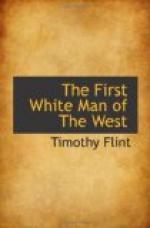While thus engaged, he met with some persons who had returned from a tour up the Missouri, who described to him the fine country bordering upon that river. The vast prairies—the herds of buffaloes—the grizzly bears—the beavers and otters; and above all, the ancient and unexplored forests of that unknown region, fired his imagination, and produced at once a resolve to remove there.
Accordingly, gathering up such useful articles of baggage as were of light carriage, among which his trusty rifle was not forgotten, he started with his family, driving his whole stock of cattle along with him, on a pilgrimage to this new land of promise. He passed through Cincinnati on his way thither in 1798. Being enquired of as to what had induced him to leave all the comforts of home, and so rich and flourishing a country as his dear Kentucky, which he had discovered, and might almost call his own, for the wilds of Missouri? “Too much crowded,” replied he—“too crowded—I want more elbow room.” He proceeded about forty-five miles above St. Louis, and settled in what is now St. Charles county. This country being still in the possession of the French and Spanish, the ancient laws by which these territories were governed were still in force there. Nothing could be more simple than their whole system of administration. They had no constitution, no king, no legislative assemblies, no judges, juries, lawyers, or sheriffs. An officer, called the Commandant, and the priests, exercised all the functions of civil magistrates, and decided the few controversies which arose among these primitive in habitants, who held and occupied many things in common. They suffered their ponies, their cattle, their swine, and their flocks, to ramble and graze on the same common prairies and pastures—having but few fences or inclosures, and possessing but little of that spirit of speculation, enterprise, and money-making, which has always characterized the Americans.
These simple laws and neighborly customs suited the peculiar habits and temper of Boone. And as his character for honesty, courage, and fidelity followed him there, he was appointed Commandant for the district of St. Charles by the Spanish Commandant. He retained this command, and continued to exercise the duties of his office with credit to himself, and to the satisfaction of all concerned, until the government of the United States went into effect.
CHAPTER XV.
Anecdotes of Colonel Boone, related by Mr. Audubon—A remarkable instance of memory.
As an evidence of the development of backwoods skill, and a vivid picture of Daniel Boone, we give the following from Mr. Audubon:




